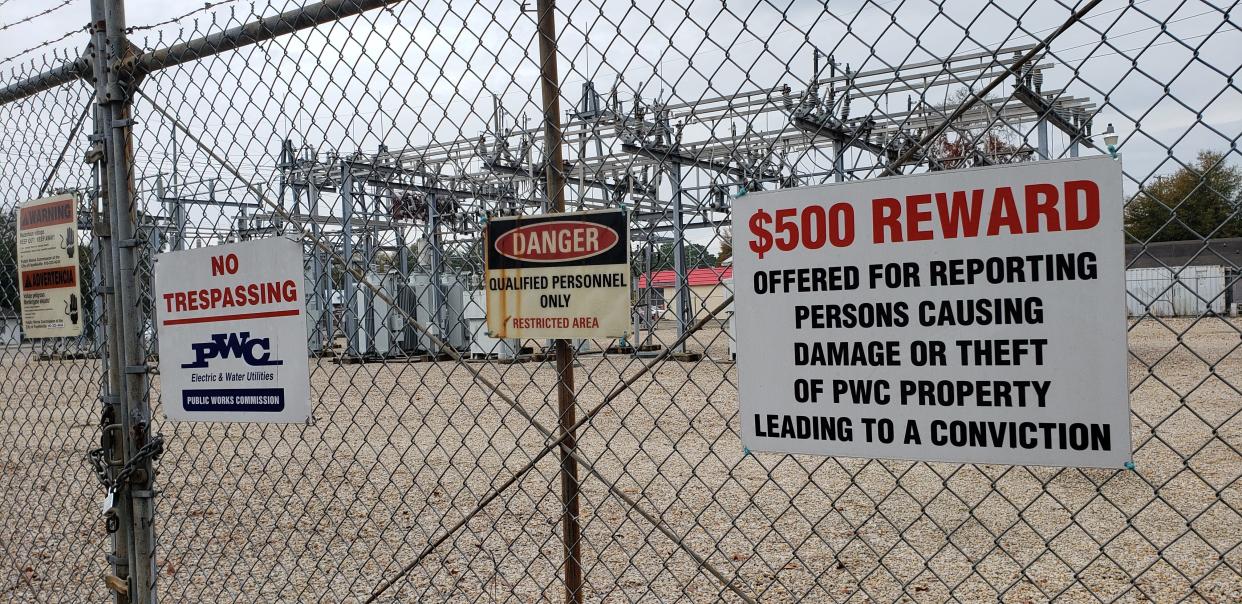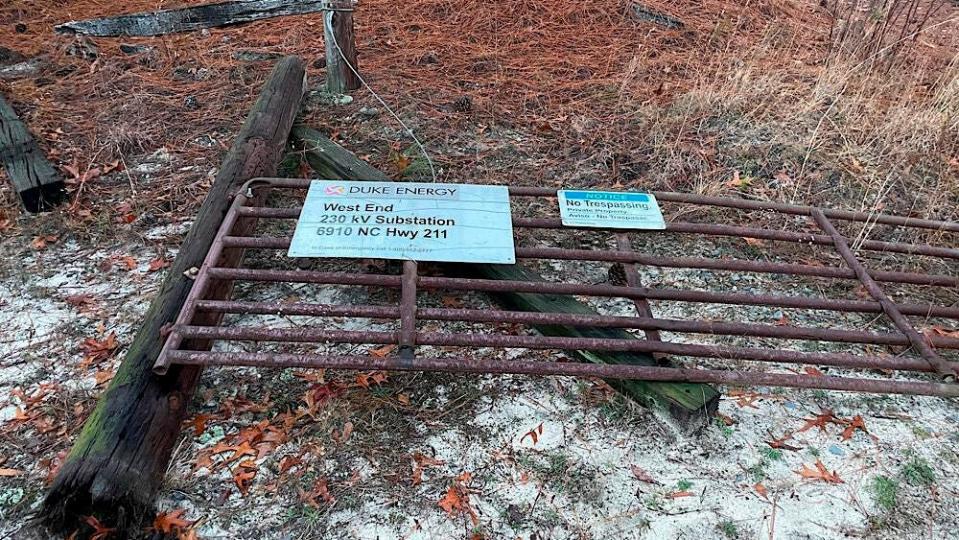In light of Moore Co. attacks, how safe are Fayetteville area substations?

Last Saturday, someone shot up at least two power substations operated by Duke Energy in what law enforcement and power company officials describe as a targeted attack.
The gunfire severely damaged the stations and left tens of thousands of residents without power for several days, as temperatures dipped across the Sandhills. The Moore County public school system closed; the main hospital, First Health, was operating on a backup generator.
The attacks are under investigation by the FBI, State Bureau of Investigation and local law enforcement, but few details have been provided. Authorities have not named any suspects or persons of interest and have not shared information on the kind of weapons used or bullets recovered, or whether there were cameras at the sites.
On Wednesday, North Carolina Gov. Roy Cooper's office announced the state, Duke Energy and Moore County were each offering a reward of up to $25,000 — a total of $75,000 — for information leading to an arrest and conviction for the person or persons responsible for the attacks.
More:Moore County substation attacks: Duke Energy says all equipment restored or replaced
More:'Intentional, willful and malicious': 40K without power after substation attacks in Moore County
For many people, the attacks threw into stark relief the surprising vulnerability of power stations — which are classified as critical infrastructure by government officials.
Social media and some residents have speculated that the attacks were domestic terrorism related to a drag show in Southern Pines the same night. The performance of the show, Downtown Divas, which took place at the Sunrise Theater, had received death threats and protests beforehand.
More:Pitts: Anger against drag shows, like in Moore County, is recent, but drag has long roots
But with so few details, we cannot know yet whether the incident is an act of terrorism or vandalism, said David Schanzer, director of the Triangle Center on Terrorism and Homeland Security and a professor at the Duke University Sanford School of Public Policy.

“Terrorism is when there’s some sort of political motivation behind an act of violence,” he said. “So until the perpetrators are captured and we have some sort of idea of what the motive was, you can’t really speculate about that.”
He said an act of vandalism would be an “unpurposeful” act of violence against a piece of property or a grievance that was personal in nature and not political.
“Let’s say I hated my neighbor, so I shot up their car or something like that.”

The U.S. power grid has in the past been the target of attacks, according to a story by the Associated Press, which noted security experts have stressed the need for utilities to better protect the grid. The story cited attacks on power stations in California and Utah. In February, three men from different states who are affiliated with a white supremacist group pleaded guilty to federal charges of plotting to attack power grids.
Officials for power companies that work in Cumberland County explained what protections they have in place to protect substations after the Saturday attacks that hit so close to home.
Increased monitoring
The Fayetteville Public Works Commission exceeds national compliance requirements for electric system security established by the North American Reliability Corporation and the Southeast Electric Reliability Corporation, wrote Carolyn Justice-Hinson, a spokesperson, in response to questions. The PWC serves 82,000 electric customers and more than 119,000 total customers.
Justice-Hinson said she could share only limited details due to concerns about security, so she did not address whether the stations are equipped with surveillance cameras.
But she said the PWC has received little to no vandalism or intentional damage at its substations. In the past few years, the most recent concerns have been related to people trying to steal copper wiring from the substations.
Justice-Hinson said reliable service is the top priority of the PWC.
“In light of the Moore County incident, we have increased our monitoring, reviewed our security procedures and are working with local law enforcement to protect our system,” she said.
What measures does South River EMC take to protect facilities?
•South River EMC has surveillance systems at all substations. These systems are a combination of cameras, audible motion-detection alarms and real-time remote monitoring. pic.twitter.com/gqTUPMh0al— South River EMC (@SouthRiverEMC) December 5, 2022
Surveillance, backup transformers
South River Electric Membership Corporation, which serves 46,000 customers in Cumberland, Harnett, Sampson, Johnston and Bladen counties, has fencing and surveillance systems at all its substations, according to spokesperson Cathy O’Dell.
“These systems are a combination of cameras, audible motion-detection alarms and real-time remote monitoring,” she wrote in an email.
O’Dell said South River keeps “substation-sized” transformers in its inventory, in addition to other key equipment and a mobile substation, in the event of an issue. They also have a way to reroute the majority of their power load to alternate sources if needed.
She said substation break-ins for South River are “extremely dangerous, but not unheard of."
“We have had a few instances of vandalism over the past few years, but nothing to the extent of the recent vandalism incident in Moore County," she said.
In the wake of the attacks, O’Dell said South River is always looking at ways to improve the safety and security of its system.
“We are in the process of upgrading our existing surveillance system and are open to other improvements that will keep our system secure,” she said.
Camera roll-out
Walter White, a spokesperson with Lumbee River Electric Membership Corporation, said the company’s substations have locked gates and many have surveillance cameras. The utility serves 54,000 members in Cumberland, Robeson, Hoke and Scotland counties.
“We started several years ago installing cameras at substations,” he said. “We haven’t completed that process yet, but we do have plans to go back and install cameras at all the ones that we have.
“Any new substation we build, cameras will be part of the plan.”
He said those plans were in place before the Moore County attacks.
But, he said, the incident, “caused us all to step back and pause for a moment to think about our plan. That was just an unbelievable attack.”
He added: “We are constantly evaluating the safeguards we have now, not just on substations, but all of our facilities, to ensure that we’re being as safe as we can and protecting the infrastructure to the best of our abilities.”
No vandalism of a South River substation has approached the scale of the Moore County damage, he said, but several years ago, when copper prices rose “sky-high,” some people would try to break into the substations.
“That was one of the things that caused us to put our previous safeguards in place,” he said.
Heightened concern since 9/11
Duke Energy also has customers in Cumberland County. Jeff Brooks, a spokesman, declined during a press conference earlier this week on the Moore County attacks to share many details about the security of its substations.
But he said the company has multiple layers of monitoring and protection for its critical infrastructure.
Whatever motives come to light in the Moore County attacks, federal officials believe more targeting of power stations is likely, and they have been tracking credible threats since 2020, according to news reports.
Schanzer, the Duke University terrorism and homeland security expert, said the prospect of violence against infrastructure is a constant concern that ramped up with the 9/11 attacks in 2001.
“Not that this started on 9/11, but we certainly started thinking about it,” he said. “If you can fly a plane into a civilian office building and the Pentagon, what else could you do to attack our infrastructure — like dams, we could say, or power or the water supply?
“It’s certainly been an element of homeland security to think about how to secure what we call critical infrastructure. Power stations or the power grid are certainly what we call critical infrastructure.”
Schanzer said he did not know the size of various substations but did not think they would generally be very large.
“You can provide some physical security to them, make sure people don’t break into them and fry themselves,” he said. “But if people have some powerful artillery, I can imagine they can do damage, and that it's pretty hard to provide protection.”
Myron B. Pitts can be reached at mpitts@fayobserver.com or 910-486-3559.
This article originally appeared on The Fayetteville Observer: In light of Moore Co. attacks, how safe are Fayetteville area substations?

